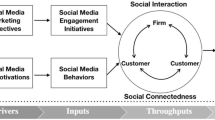Abstract
This article reviews the history of marketing thought in relation to social responsibility and business ethics. The main objective of the article is to show that business can be profitable and socially responsible at the same time by practising the societal marketing concept. More specifically, it presents the development of a marketing philosophy, discusses the influence of consumerism on the marketing concept and deals with ethics and social responsibility in marketing. It is argued that organisations who adopt the societal marketing concept will be the ones most likely to make long-run profits as well as be beneficial to society as a whole.
Similar content being viewed by others
References
Bartels, R.: 1967, ‘A Model for Ethics in Marketing’, Journal of Marketing 31, 21.
Bartels, R.: 1970, Marketing Theory and Metatheory, Homewood, Ill., Richard D. Irwin.
Bartels, R.: 1974, ‘The Identity Crisis in Marketing’, Journal of Marketing 38, 73–76.
Beauchamp, T. L. and Bowie, N. E. (eds.): 1983, Ethical Theory and Business, Englewood Cliffs, NJ, Prentice Hall.
Bell, M. L. and Emory, C. W.: 1971, “The Faltering Marketing Concept’, Journal of Marketing 35, 37–42.
Bloom, P. N. and Greyser, S. A.: 1981, ‘The Maturing of Consumerism’, Harvard Business Review 61, 130–139.
Carroll, A. B.: 1981, Business and Society, Boston, MS, Little, Brown and Company.
Davis, K. and Blomstrom, R. L.: 1975, Business and Society: Environment and Responsibility, New York, NY, McGraw-Hill.
Davis, K., Frederick, W. C., and Blomstrom R. L.: 1980, Business and Society, New York, NY, McGraw-Hill.
Dawson, L. M.: 1969, ‘The Human Concept: New Philosophy for Business’, Business Horizons 12, 29–38.
Donaldson, T. and Werhane, P. H. (eds.): 1983, Ethical Issues in Business, Englewood Cliffs, NJ, Prentice Hall.
Drucker, P. F.: 1969, ‘The Shame of Marketing’, Marketing/Communications, 60–64.
Drucker, P. F.: 1982, The Changing World of the Executive, London, William Heinemann.
El-Ansary, A. I.: 1974, ‘Societal Marketing: A Strategic View of the Marketing Mix in the 1970s’, Journal of the Academy of Marketing Science 2, 553–566.
Enis, B. M. and Cox, K. K. (eds.): 1981, Marketing Classics, Boston, MS, Allyn and Bacon.
Evans, J. R. and Berman, B.: 1985, Marketing, New York, N.Y., Macmillan Publishing Company.
Feldman, L. P.: 1971, ‘Societal Adaptation: A New Challenge for Marketing’, Journal of Marketing 35, 54–60.
Fine, S. H.: 1981, ‘Pet Languages Confuse; Let's Standardise Nonprofit, Social, Societal Marketing Definitions’, Marketing News 15, 1.
Flax, S.: 1983, ‘The Dubious War on Plastic Pipe’, Fortune, February 7, 68–74.
Friedman, M.: 1962, Capitalism and Freedom, Chicago, Ill., University of Chicago Press.
Gaski, J. F.: 1985, ‘Dangerous Territory: The Societal Marketing Concept Revisited’, Business Horizons 28, 42–47.
Goodpaster, K. E. and Matthews, J. B.: 1982, ‘Can a Corporation Have a Conscience?’, Harvard Business Review 60, 132–141.
Higgens, K.: 1983, ‘Debate Rages over Marketing and Alcohol Problems’, Marketing News, Sept. 30, 1–4.
Keith, R. J.: 1960, ‘The Marketing Revolution’, Journal of Marketing 24, 35–38.
Kotler, P.: 1972, ‘What Consumerism Means for Marketers’, Harvard Business Review 50, 48–57.
Kotler, P.: 1984, Marketing Management: Analysis, Planning and Control, London, Prentice Hall.
Kotler, P. and Levy, S. J.: 1971, ‘Demarketing, Yes, Demarketing’, Harvard Business Review 49, 74–80.
Ladd, J.: 1970, ‘Morality and the Ideal of Rationality in Formal Organisations’, The Monist 54, 448–516.
Lavidge, R. J.: 1970, ‘The Growing Responsibilities of Marketing’, Journal of Marketing 34, 25–28.
Lazer, W.: 1969, ‘Marketing's Changing Social Relationships’, Journal of Marketing 33, 3–9.
Lewin, T.: 1983, ‘Business Ethics' New Appeal’, New York Times, December 11, Section 3, 4.
McCall, D. B.: 1973, ‘Profit: Spur for Solving Social Ills’, Harvard Business Review 51, 46–54.
Nash, L. L.: 1981, ‘Ethics without the Sermon’, Harvard Business Review 59, 79–90.
Nickels, W. G.: 1974, ‘Conceptual Conflicts in Marketing’, Journal of Economics and Business 26, 140–143.
Schwartz, G.: 1971, ‘Marketing: The Societal Concept’, University of Washington Business Review 31, 33–38.
Shuptrine, F. K. and Osmanski, F. A.: 1975, ‘Marketing's Changing Role: Expanding or Contracting?’, Journal of Marketing 39, 58–66.
Simon, J. G., Powers, C. W., and Gunnemann, M.: 1983, ‘The Responsibilities of Corporations and Their Owners’, in Beauchamp, T. L. and Bowie, N. E. (eds.), Ethical Theory and Business, Englewood Cliffs, NJ, Prentice Hall, 86–93.
Stidson, B. and Schutte, T. F.: 1972, ‘Marketing as a Communication System — The Marketing Concept Revisited’, Journal of Marketing 36, 22–27.
Takas, A.: 1974, ‘Societal Marketing: A Businessman's Perspective’, Journal of Marketing 38, 2–7.
Weiss, E. B.: 1968, ‘Marketers Fiddle While Consumers Burn’, Harvard Business Review 46, 45–53.
Wilson, J. A.: 1975, ‘Morality and the Contemporary Business System’, Journal of Contemporary Business 4, 31–58.
Author information
Authors and Affiliations
Additional information
Russell Abratt is Associate Professor of Marketing at the University of the Witwatersrand, Johannesburg, South Africa. He has published in the Journal of Business Ethics, European Journal of Marketing, International Journal of Advertising, Industrial Marketing Management and the Quarterly Review of Marketing amongst others. His current research interests are in Social Marketing, Industrial Marketing and Retailing. He has also taught at the Unversity of Melbourne in Australia and the Ohio State University in the U.S.A.
Diane Sacks is an LLM student at Harvard University. She holds the BA, LLB, and MBA degrees from the University of the Witwatersrand, Johannesburg.
Rights and permissions
About this article
Cite this article
Abratt, R., Sacks, D. The marketing challenge: Towards being profitable and socially responsible. J Bus Ethics 7, 497–507 (1988). https://doi.org/10.1007/BF00382596
Issue Date:
DOI: https://doi.org/10.1007/BF00382596




